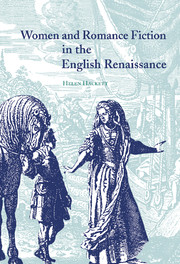Book contents
- Frontmatter
- Contents
- Acknowledgements
- List of abbreviations and a note on the text
- Introduction
- 1 The readership of Renaissance romance
- 2 Renaissance romance and modern romance
- 3 Novellas of the 1560s and 1570s
- 4 Spanish and Portuguese romances
- 5 Fictions addressed to women by Lyly, Rich and Greene
- 6 The ‘Arcadia’: readership and authorship
- 7 The ‘Arcadia’: heroines
- 8 ‘The Faerie Queene’
- 9 Shakespeare's romance sources
- 10 Lady Mary Wroth's ‘Urania’
- Epilogue: The later seventeenth century
- Notes
- Bibliography
- Index
3 - Novellas of the 1560s and 1570s
Published online by Cambridge University Press: 01 September 2009
- Frontmatter
- Contents
- Acknowledgements
- List of abbreviations and a note on the text
- Introduction
- 1 The readership of Renaissance romance
- 2 Renaissance romance and modern romance
- 3 Novellas of the 1560s and 1570s
- 4 Spanish and Portuguese romances
- 5 Fictions addressed to women by Lyly, Rich and Greene
- 6 The ‘Arcadia’: readership and authorship
- 7 The ‘Arcadia’: heroines
- 8 ‘The Faerie Queene’
- 9 Shakespeare's romance sources
- 10 Lady Mary Wroth's ‘Urania’
- Epilogue: The later seventeenth century
- Notes
- Bibliography
- Index
Summary
WILLIAM PAINTER'S PALACE OF PLEASURE, 1566 AND 1567
The story of Elizabethan fiction can be said to begin with this work, a collection, as the 1566 title page has it, of ‘Pleasaunt Histories and excellent Novelles, selected out of divers good and commendable authors’. ‘Novelle’ here is usually rendered in modern English not as ‘novel’ but as ‘novella’. This term designates stories which are relatively short: each of Painter's tales is only a few pages long, and some are even less than two pages. Novellas could also be more domestic and contemporary in setting than romances and tended to make greater claims to documentary truth; Painter refers to his stories not only as ‘Novelles’ but also as ‘histories’ and ‘newes’, both terms which imply some degree of factuality. Nevertheless, novellas often depicted marvellous and heroic events, and shared with romances an interest in matters of courtship. As the origin of the term novella implies, the genre was especially associated with Italian authors, including Boccaccio and Bandello, although Painter's sources also range among Greek, Latin, English and French authors, including one woman, Margaret of Navarre (1492–1549), author of a collection of tales of love named the Heptameron.
The first volume of 1566 was sufficiently successful to inspire a sequel the next year and imitations, and the Palace became a fertile source for later Elizabethan and Jacobean drama. It is a compendium of many diverse kinds of story, not just tales of courtship: it includes not only the rape of Lucrece, and the source stories for All's Well That Ends Well, The Duchess of Malfi and Romeo and Juliet, but also the source stories for Coriolanus and Timon of Athens.
- Type
- Chapter
- Information
- Women and Romance Fiction in the English Renaissance , pp. 33 - 54Publisher: Cambridge University PressPrint publication year: 2000



